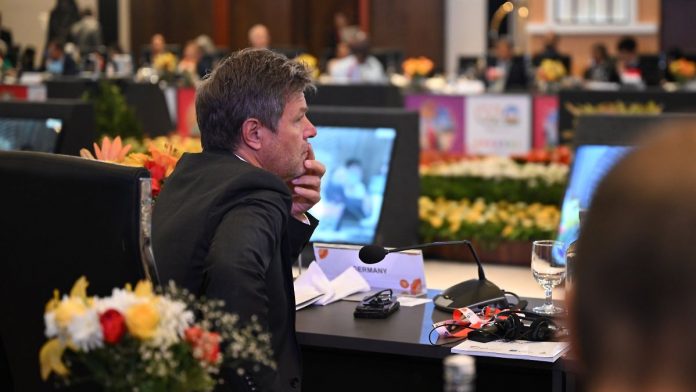In order to slow down the faster expansion of green electricity, Russia is using destructive negotiating tactics before the meeting of the G20 energy ministers in India. This is also why there is no consensus.
The G20 countries have not been able to agree on accelerating the expansion of renewable energies. There was no common, binding final declaration. Russia’s blockade tactics contributed significantly to this. At the end of the meeting of the energy ministers of the most important industrial and emerging countries in Goa, India, Economics and Climate Protection Minister Robert Habeck accused Russia of a complete “misunderstanding of reality”. Russia’s deputy energy minister blamed the war in Ukraine on the 2008 financial crisis, he said. This can be described in a friendly way with “alternative facts”.
According to Habeck, there was deep frustration among interlocutors about Russian behavior. The country didn’t make any friends with it. This was preceded by tough negotiations over the final text.
Even before the start, it was clear that there would be no joint, unanimous declaration because Russia and Saudi Arabia, for example, as exporters of fossil energy, were blocking more ambitious goals on the way to expanding renewable energies. For example, they rejected the proposal to triple the share of renewable energy in G20 countries by 2030. Currently, the global renewable energy capacity is 3.3 terawatts, the lion’s share lies with the G20 countries.
Representatives of the member states negotiated for two days until the early hours of the morning. The conversations were even more difficult than in previous years. In addition, there were preventive tactics on the part of the Russian side. According to information from ntv, this consisted, among other things, of giving long speeches without advancing the content of the negotiations. This meant that time was lost for substantive discussions. The Russian side also achieved this with a bizarre proposal: the protection of dams as critical infrastructure for energy supply should be included in the final document – after the destruction of the Kakhovka dam and the occupation of the Zaporizhzhia nuclear power plant in the wake of the Russian war of aggression in Ukraine unmistakable provocation.


